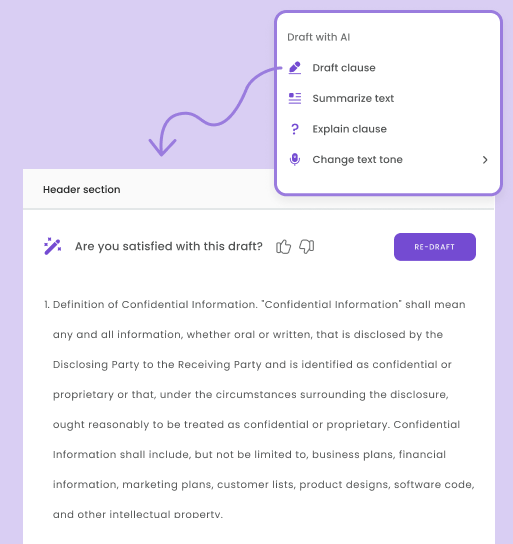In law, there’s an interesting thing called an implied contract.
Depending on the intent (or lack thereof) of parties involved in certain transactions, a contract can be inferred to exist.
This can be beneficial or detrimental to you depending on the situation.
This guide will look at what an implied contract is, how it comes about, the legal implications, and more.
Understanding Implied Contracts
Implied contracts, distinct from express contracts that are explicitly stated, are agreements inferred from the actions, conduct, or circumstances of those involved.
These contracts share key characteristics and elements with express contracts, including mutual assent, offer and acceptance, consideration, and the intent to create legal obligations.
Implied contracts materialize when the conduct of the parties suggests an agreement, even if not expressly articulated.
Types of implied contracts:
- Implied-in-fact contracts: Implied-in-fact contracts arise from the conduct or circumstances of the parties, implying an agreement that would have been reached had negotiations occurred.
They are based on the parties’ actions, conduct, or course of dealing, indicating an implicit agreement between them.
These contracts are typically inferred from the behavior or interactions of the parties and may involve an implied promise or commitment to perform certain obligations.
- Implied-at-law contracts: Implied-at-law contracts, also known as quasi-contracts, are not true contracts but legal constructs aimed at preventing unjust enrichment.
They emerge when one party confers a benefit upon another, and the law imposes an obligation to compensate for that benefit, even without mutual consent. Quasi-contracts are based on principles of fairness and equity, seeking to prevent one party from unjustly benefiting at the expense of another.
They are imposed by the law to remedy situations where one party has received a benefit at the expense of another without a valid contractual agreement.
Legal basis and principles behind implied contracts:
The legal basis of implied contracts rests on principles of fairness, equity, and the prevention of unjust enrichment. Implied contracts operate on the premise that parties should be held accountable for the reasonable expectations and obligations arising from their conduct, promoting fairness and ensuring enforceability under the law.
These contracts embody principles of good faith, fair dealing, and the objective assessment of parties’ intentions, facilitating equitable outcomes in contractual disputes.
The law recognizes implied contracts as valid and enforceable agreements, provided they meet the essential elements required for contract formation, even if not expressly stated in written or verbal terms.
Use Cases of Implied Contracts
Employment relationships:
Implied contracts frequently arise in employment relationships, where parties conduct themselves in a manner that suggests the existence of an agreement, even if not explicitly stated.
For example, an employee may begin work based on an understanding of salary, benefits, and job duties communicated during the hiring process, forming an implied employment contract.
Similarly, employers may provide ongoing employment and benefits to workers, implying a contractual obligation to compensate for services rendered.
Services provided without explicit agreement:
In situations where services are rendered without an explicit agreement, implied contracts may come into play.
For instance, if someone hires a plumber to fix a leaking pipe without discussing payment terms, an implied contract may be formed based on the expectation of reasonable compensation for the services provided.
Similarly, when individuals engage professionals such as doctors, lawyers, or consultants for services, the parties may be bound by implied contracts based on the expectation of payment for services rendered.
Goods or property delivered and accepted:
Implied contracts can also arise in transactions involving the delivery and acceptance of goods or property.
For instance, if a supplier delivers goods to a customer who accepts and uses them without explicit agreement on payment terms, an implied contract may be inferred based on the parties’ conduct.
By accepting the goods, the customer implicitly agrees to compensate the supplier for the value received, forming an implied contract for the sale of goods.
Scenarios where parties act in a manner suggesting contractual intent:
Implied contracts may arise in scenarios where parties act in a manner suggesting mutual agreement and intent to be bound by contractual obligations.
For example, suppose two parties negotiate for the sale of real estate but fail to reach a formal written agreement. In that case, their conduct during negotiations may imply an intention to be bound by the terms discussed.
Similarly, if parties engage in a course of dealing over time, their consistent actions and behavior may imply a contractual relationship, even without explicit agreement.
Instances where one party relies on the performance of another:
Implied contracts often arise when one party relies on the performance of another to their detriment.
For example, if one party provides goods or services with the expectation of payment and the other party accepts and benefits from the goods or services without objection, an implied contract may be formed based on the principle of unjust enrichment.
Similarly, if one party relies on another’s promise to their detriment, the law may imply a contract to prevent unfairness or injustice.
Implied contracts find application in various scenarios. These include employment relationships, services provided without explicit agreement, delivery and acceptance of goods or property, and more.
It’s important to note that these contracts are inferred from the conduct, actions, or circumstances of the parties involved, demonstrating the flexibility and adaptability of contract law to address diverse transactions and relationships.
Establishing the Existence of an Implied Contract
There are a few things that need to be true before you can say that an implied contract exists in most cases. This is to reduce the prevalence of people taking advantage of implied contracts to ‘force’ benefits onto others in exchange for fair compensation.
Key elements to consider:
- Mutual assent or agreement: This is also known as the meeting of the minds. Both parties must demonstrate a shared intention to be bound by the terms of the contract, whether explicitly or implicitly inferred from their conduct or circumstances.
- Intent of the parties: Evaluate whether the parties intended to enter into a contractual relationship based on their words, actions, or surrounding circumstances. Intent can be inferred from the parties’ behavior, communications, and the context of the transaction.
- Conduct and actions of the parties: The conduct and actions of the parties play a significant role in establishing the existence of an implied contract. Courts often look at how the parties have acted and interacted with each other to discern whether there is evidence of an agreement. Conduct such as performance of services, delivery of goods, or acceptance of benefits can indicate an implied agreement between the parties.
- Reasonableness and fairness: Courts consider the reasonableness and fairness of the parties’ actions and expectations when determining the existence of an implied contract. The terms and conditions implied by the parties’ conduct should be fair and reasonable under the circumstances. Courts may refuse to enforce an implied contract if it would lead to unfairness or injustice.
Factors influencing the determination of an implied contract:
- Communication between parties: Communication between the parties, whether verbal or written, can influence the determination of an implied contract. Expressions of intent, negotiations, or discussions between the parties may provide evidence of an implied agreement. Even in the absence of explicit agreement, the parties’ communications can help establish mutual assent and intent.
- Industry customs and practices: Industry customs and practices can influence the determination of an implied contract, particularly in commercial transactions. Certain industries may have established customs or practices that imply contractual obligations between parties. Courts may consider these customs and practices when determining whether an implied contract exists and the terms implied therein.
- Prior dealings and relationships: Prior dealings and relationships between the parties can also influence the determination of an implied contract. If the parties have engaged in previous transactions or have an ongoing business relationship, their past conduct and course of dealing may imply an agreement in subsequent transactions. Courts may look at the parties’ prior interactions to determine the existence and terms of an implied contract.
Establishing the existence of an implied contract involves considering key elements such as mutual assent, intent of the parties, conduct and actions, and reasonableness.
Factors such as communication between parties, industry customs, and prior dealings can also influence the determination of an implied contract.
By analyzing these elements and factors, courts can determine whether the parties intended to be bound by contractual obligations, even if not expressly stated in written or verbal terms.
Legal Implications and Enforcement of Implied Contracts
Legal recognition and enforceability:
Implied contracts are legally recognized and enforceable agreements, provided they meet the essential elements required for contract formation.
While implied contracts may not be explicitly stated in written or verbal terms, they are binding agreements inferred from the conduct, actions, or circumstances of the parties involved.
Courts uphold implied contracts and enforce their terms based on principles of contract law, including mutual assent, consideration, and the intent to create legal obligations.
Implied contracts are subject to the same legal standards and requirements as express contracts, and parties can seek legal remedies for breaches or disputes arising from implied contractual obligations.
Remedies available for breach of implied contracts:
In the event of a breach of an implied contract, you have access to legal remedies to enforce your rights and seek compensation for damages incurred. Remedies for breach of implied contracts may include:
- Damages: The non-breaching party may be entitled to monetary damages to compensate for losses suffered as a result of the breach. Damages are typically awarded to put the injured party in the position they would have been in had the breach not occurred.
- Specific performance: In cases where monetary damages are inadequate to remedy the harm caused by the breach, the court may order specific performance, requiring the breaching party to fulfill their contractual obligations as agreed upon in the implied contract.
- Rescission: Rescission involves canceling the contract and restoring the parties to their pre-contractual positions. Rescission may be available if the breach is material or if the contract was entered into based on a mutual mistake or misunderstanding.
- Restitution: Restitution involves returning any benefits or payments received under the contract to the non-breaching party. This remedy aims to prevent unjust enrichment and restore the parties to their pre-contractual positions.
Importance of documenting agreements and intentions to avoid misunderstandings:
To avoid misunderstandings and disputes related to implied contracts, strive to document agreements and intentions clearly and explicitly whenever possible.
While implied contracts may be inferred from the parties’ conduct or circumstances, documenting agreements in writing can provide clarity and certainty regarding the parties’ intentions and obligations.
Written contracts help establish the terms of the agreement, clarify expectations, and mitigate the risk of disputes or misunderstandings.
By documenting agreements and intentions in writing, parties can avoid ambiguity and uncertainty, ensuring that their contractual relationships are legally enforceable and binding under the law.
Conclusion
Implied contracts can help those who have agreed without written evidence. At the same time, it can be detrimental to others that don’t have a written agreement. It all depends on your perspective.
To prevent ambiguity and legal proceedings, it’s important to be clear in your communications. For example, saying things like this does not constitute entering into an agreement or assent to terms.
At the end of the day, the best bet is to write and sign your agreements. If not, all parties will be at the mercy of the court system.
Let me know what you think in the comments and don’t forget to share.




